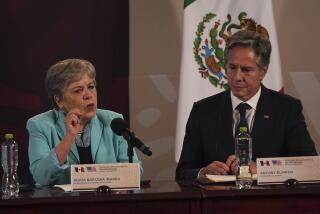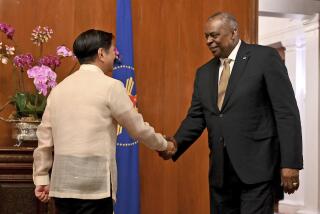It’s Up to the Philippines
- Share via
The deep and admiring impression that President Corazon Aquino left on official Washington during her state visit is not likely to be lost on her critics and antagonists in the Philippines. The message of support that she carries home, after meeting with President Reagan and addressing Congress, is clear and it is firm. Aquino’s efforts to deal with the manifold problems that are the legacy of Ferdinand E. Marcos’ long dictatorship have strong American backing. While the communist-led insurgency is unlikely to be moved by this evidence of commitment, Aquino’s other opponents, on both the left and the right, can hardly afford to ignore it.
For the moment the most important of those antagonists is Defense Minister Juan Ponce Enrile, whose last-minute defection from the Marcos camp was vital to the success of last February’s revolution. Enrile is unhappy with Aquino’s tactics of trying to win over the insurgents by peaceful methods, and his increasingly vocal complaints have been echoed by some anonymous Pentagon officials. But Reagan made a point of publicly endorsing Aquino’s approach, while Aquino herself, in her address to Congress, emphasized that she is prepared to use force if the olive branch that she is holding out is rejected.
Aquino’s critics on the left, meanwhile, have their own agenda. They are impatient with the pace of the reforms that Aquino has promised and that the Philippines desperately needs. But to a great extent major reforms await a stabilization of the economy, which declined in the last three years of Marcos’ corrupt rule. Some progress at least seems to have been made in arresting economic deterioration. Inflation has been brought down, the flight of capital has been slowed if not halted, foreign investors are beginning in a modest way to look on the Philippines as an opportunity. The United States, within its own budgetary limits, has signaled its readiness to help. So have the International Monetary Fund and the World Bank.
But the fundamental problems remain. Too many Filipinos are without employment, too many go hungry, too many die needlessly because health care is inadequate. Land reform is imperative if tens of millions of Filipinos are to feel that they have a stake in their society. Export industries must be developed more rapidly to reduce the staggering foreign-debt burden.
Aquino’s efforts have won strong endorsement in the United States. In the end and inescapably, though, the success of those efforts will be determined by what Filipinos and their government have the courage and the will to do.
More to Read
Sign up for Essential California
The most important California stories and recommendations in your inbox every morning.
You may occasionally receive promotional content from the Los Angeles Times.










